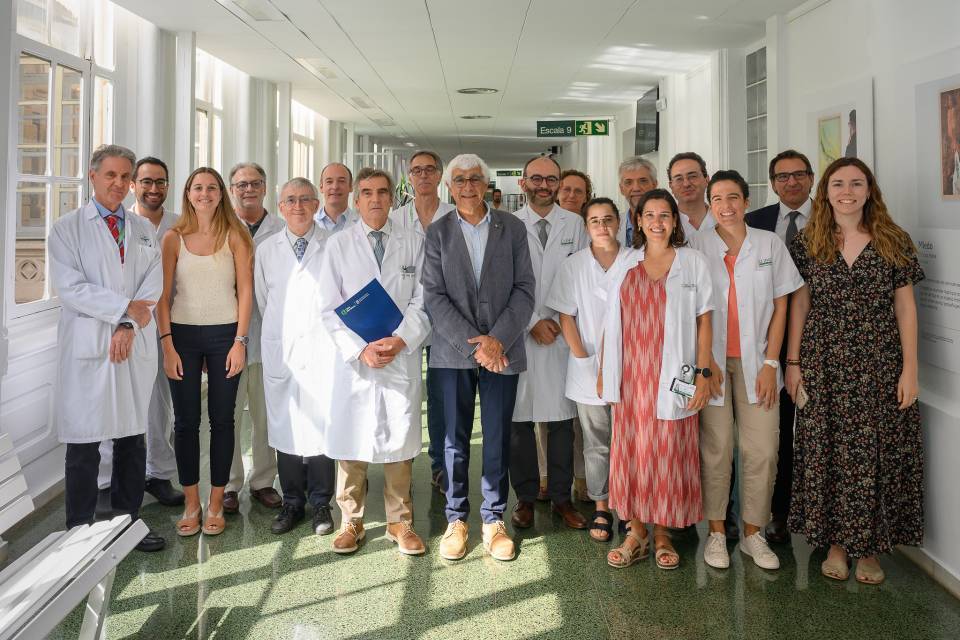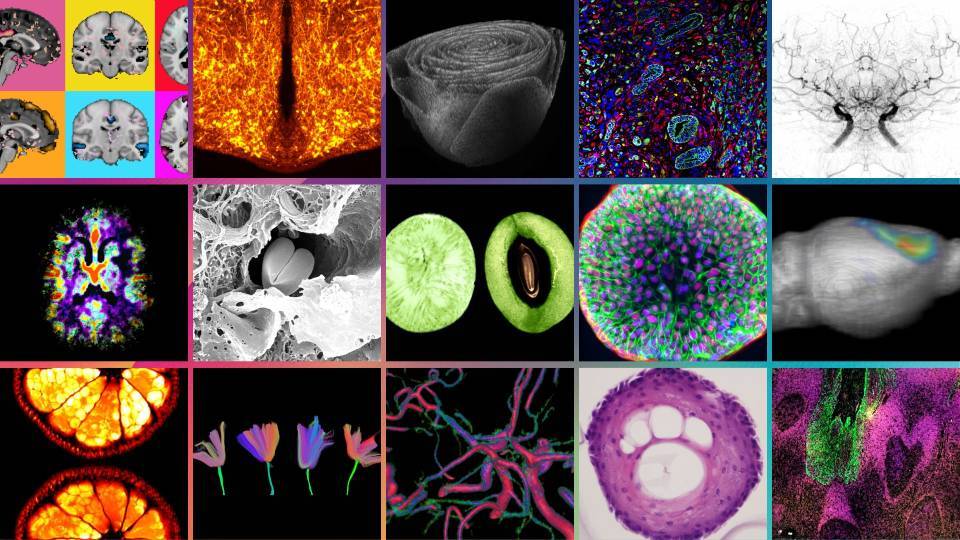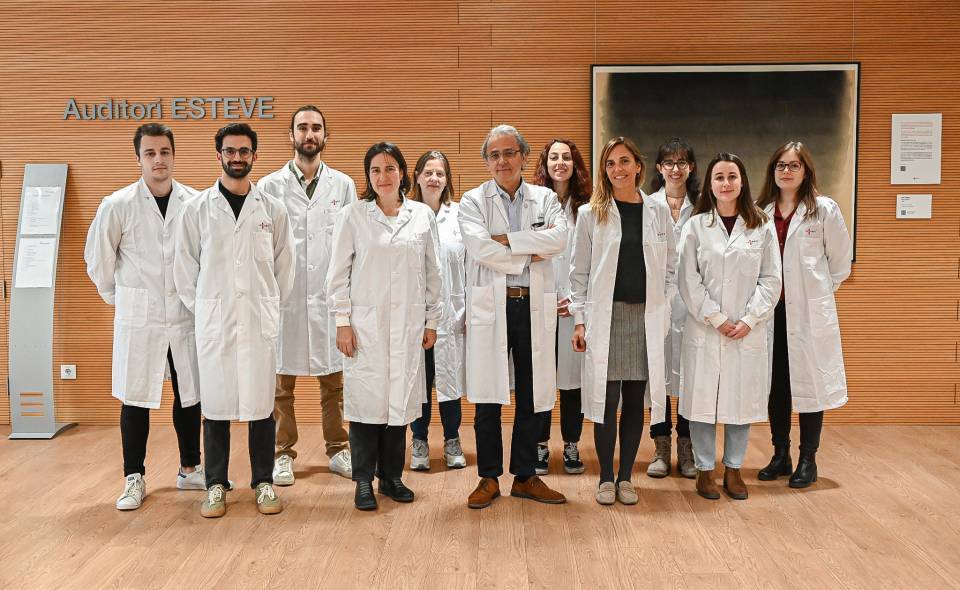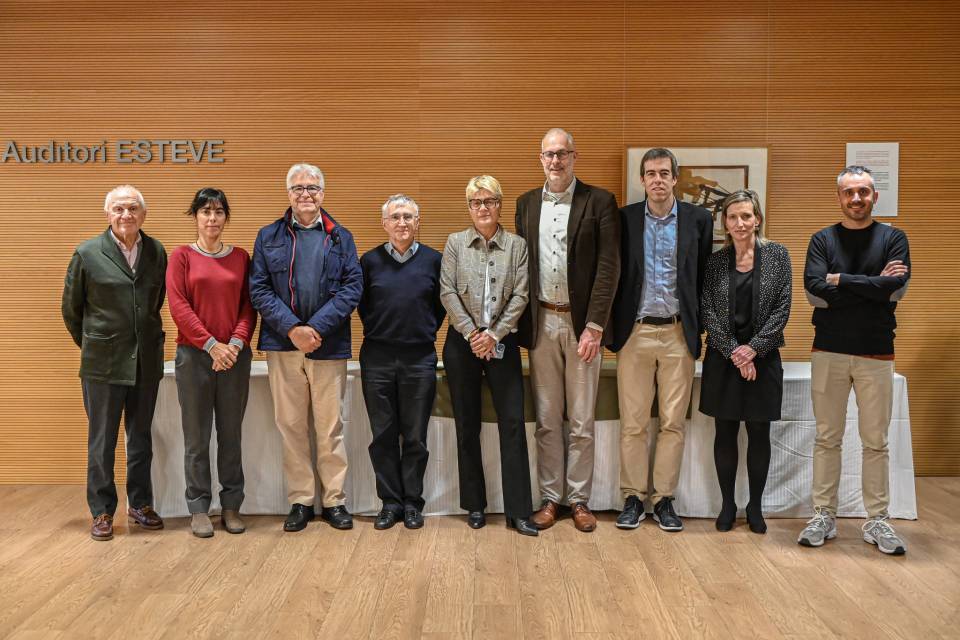The CAR-T ARI0002h, developed at the Hospital Clínic Barcelona-IDIBAPS, has been approved by the Committee for the Evaluation of Medicinal Products for Human Use of the Spanish Agency of Medicines and Medical Devices (AEMPS) for its use as a non-industrially manufactured advanced therapy medicinal product in patients with relapsed multiple myeloma.
This was explained today in a press conference by the Minister of Health of the Generalitat de Catalunya, Dr. Manel Balcells; Dr. Josep M. Campistol, director general of the Hospital Clínic; Dr. Elías Campo, director of IDIBAPS; Ignasi López, Department of Relations with Research and Health Institutions, of "la Caixa" Foundation; Dr. Carlos Fernández de Larrea, haematologist at the Clínic and head of the IDIBAPS Myeloma, Amyloidosis, Macroglobulinaemia and other Gammapathies group; Dr. Álvaro Urbano, coordinator of the Clínic-IDIBAPS CAR-T Programme and head of the IDIBAPS Hematopoietic Progenitor Cell Transplantation group; and Dr. Manel Juan, head of the Immunology Service at the Clínic and of the IDIBAPS Immunogenetics and Immunotherapy in Autoinflammatory and Immune Responses group.
The Minister of Health, Manel Balcells, stated that, "what we are doing here today is exceptional, the result of teamwork, of a great many talented people. And that is in addition to other initiatives that also coexist in Catalonia, and the sum total means we can be a benchmark for improving the quality of life of people suffering from different diseases such as leukaemia, lymphoma, myeloma or blood diseases”. And he added: “We’re speaking about the future, a future that is already present, and how to make this reach everyone, how we socialize these therapies”.
In this respect, Balcells stressed that in Catalonia, "we have followed a country strategy around the creation of the Catalan centre for advanced therapies, which is underway. It has been approved by the Government, has its budget, and the first meeting of its steering committee will be held before the end of this month."
Dr. Josep M. Campistol explained that, “obtaining the approval of the AEMPS Committee is a milestone and is the result of hard work by many professionals and researchers at the hospital. This is the second CAR T-cell therapy developed at the hospital with the aim of offering the best therapeutic alternative for each patient. To achieve this, we have had the support of the ARI project and the different entities and institutions that have provided us with financial backing”.
Dr. Elias Campo pointed out that, "CAR T-cell therapy is a paradigmatic example of how excellent biomedical research improves people’s quality of life, and in this case the CAR-T ARI0002h helps patients with multiple myeloma".
Ignasi Lopez, pointed out that, “the approval of this treatment demonstrates the translational nature of immunotherapy research at the Hospital Clínic. This is research aimed at improving people’s health and quality of life. This is also one of our founding objectives. Providing patients with solutions justifies all our hard work.”
The approval by the AEMPS Committee is the step prior to the notification of the approval of the hospital exemption that the Hospital Clínic Barcelona will receive in the next few days. The approval process at the hospital was coordinated by the Clinical Pharmacology Service team, led by Dr. Gonzalo Calvo.
The development of the CAR-T at the Clínic-IDIBAPS has the fundamental support of the ”la Caixa” Foundation and the Carlos III Health Institute (ISCIII). It has also received funding from the Spanish Association Against Cancer (AECC) and the Bosch Aymerich Foundation.
Moreover, the Clínica Universidad de Navarra will be authorized as a second production centre, since it has also produced CAR T-cell therapy for clinical trials.
ARI0002h: the first CAR T-cell therapy developed entirely in Europe for multiple myeloma
Multiple myeloma is a type of cancer that affects plasma cells in the bone marrow. It accounts for about 10% of all blood cancers and, although various treatments are available, many patients develop resistance, leading to relapses and an urgent need for new therapies to treat them. This is where CAR T-cell therapies can play a key role.
CAR-T ARI0002h was developed entirely at IDIBAPS by Dr. Álvaro Urbano-Ispizua’s research group. It is the first European CAR-T to demonstrate clinical efficacy in patients with multiple myeloma. More specifically, it is a CAR T-cell therapy that targets the BCMA antigen, which is found on the surface of myeloma tumour cells. Two previous studies led by the Clínic-IDIBAPS and published in the journals Lancet Oncology and Clinical Cancer Research showed the efficacy of the CAR T-cell therapy ARI0002h in patients with multiple myeloma who had relapsed after at least two lines of treatment and had already been exposed to the main drugs used with this disease.
The two studies validated the efficacy of the treatment in a total of 60 patients and the results showed that 95% of the patients responded to the treatment with a favourable toxicity profile.
Dr. Carlos Fernández de Larrea led the clinical development of the CAR T-cell therapy ARI0002h, in which seven Spanish hospitals took part: Hospital Clínic de Barcelona, Clínica Universidad de Navarra, Hospital Universitario de Salamanca, Hospital Universitario Virgen de la Arrixaca in Murcia, Hospital Universitario 12 de Octubre in Madrid, Hospital Universitario Virgen del Rocío in Sevilla and Hospital Clínico Universitario de Santiago de Compostela. The preparation of the CAR T-cell therapies for administration to patients was carried out at the Hospital Clínic de Barcelona, by the Immunology Service team led by Dr. Manel Juan, and at the Clínica Universidad de Navarra.
Optimizing treatment with CAR T-cell therapy
The effectiveness of the treatment is not only evaluated by the patient’s initial response, but also by the durability of this response. Thus, the researchers also described the optimal way to administer the treatment and identified biomarkers of response, which could improve patient selection and the personalization of treatment.
The first dose is administered fractionally, in three aliquots, and 100 days after the first infusion, a booster dose is administered, which provides a sustained response over time with low toxicity. This reduces the severity of the adverse effects without reducing the efficacy of the treatment.
Moreover, different factors and biomarkers were analysed, which allow us to predict the response and its duration after treatment with ARI0002h. "Knowing which patients will respond favourably to therapy will allow us to optimize the results, adjust the therapeutic strategy and minimize the side effects", says Carlos Fernández de Larrea.
What is CAR T-Cell Therapy?
CAR T-cell therapy (Chimeric Antigen T-cell Receptor therapy), is a treatment that involves the genetic modification of the patient’s T cells, so that they can recognize and attack cancerous cells.

In the case of CAR-T ARI0002h, it was designed specifically to attack multiple myeloma cells, a type of cancer that affects plasma cells in the bone marrow.




